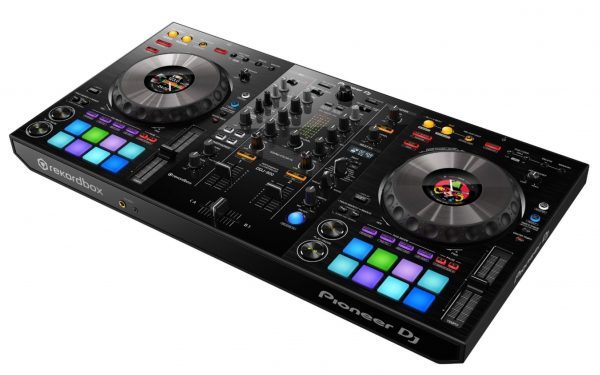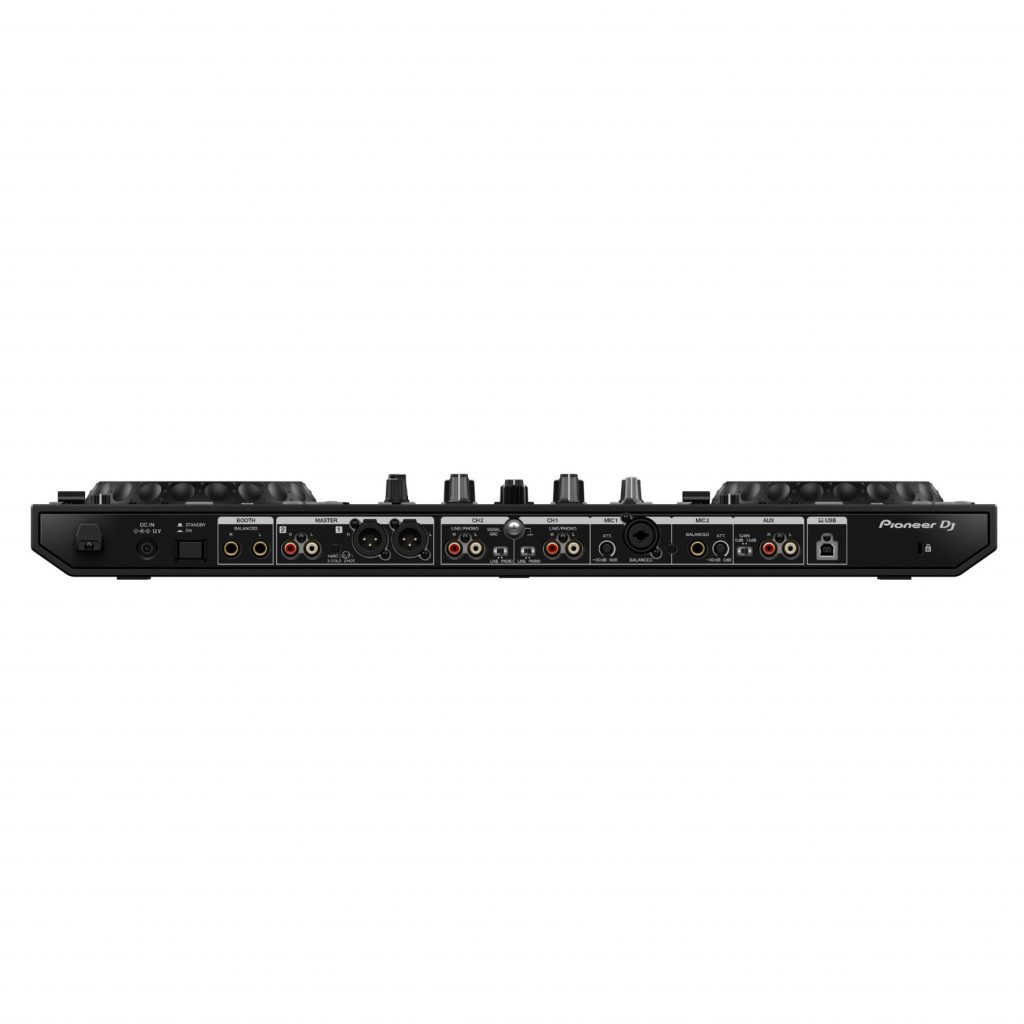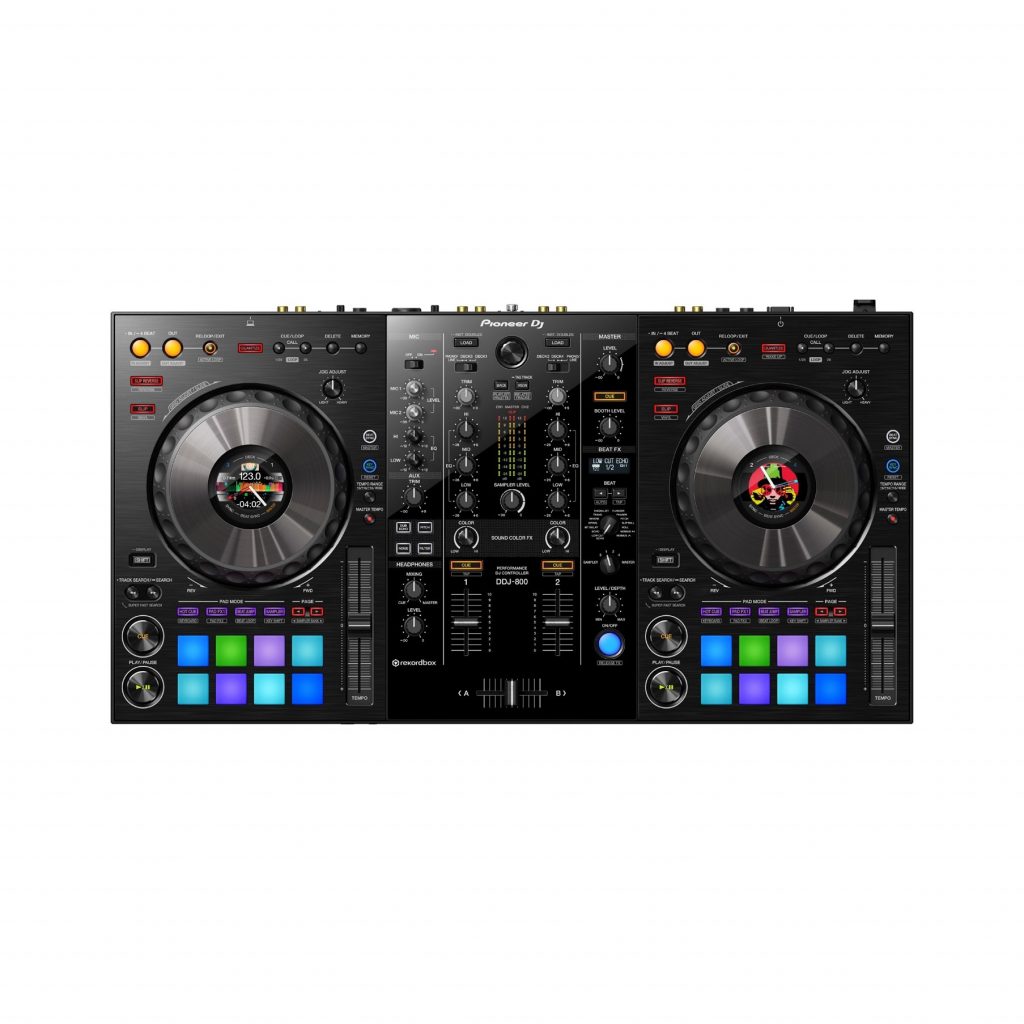On Monday night we got news of a leak from a DJ shop on Instagram, quickly we discovered that Pioneer DJ were in fact releasing a new controller to complete the new line up of Rekordbox specific units. Gone are the old DDJ RB,RR, RX and RZ units based from models initially released with Serato. This new wave of controllers, all with number based model names, are modelled on club standard layouts and are designed to work seamlessly with Rekordbox only.
The first model to be released, the DDJ 1000 quickly became a best seller, the follow up entry level DDJ 400 also proved to be just as strong. Now it’s time for a unit in the middle, introducing the Pioneer DDJ 800. A controller with big boots to fill and the largest market to attract. No pressure then Pioneer!
The Design
Taking obvious design cues from the larger DDJ 1000 unit, the DDJ 800 will forever be referred to and seen as the 2 channel version of the 1000 such are its similarities. However as we will find out, this isn’t just a scaled down 1000 unit. The design is based on the club standard layout of 2 Pioneer CDJ decks wrapped around a DJM mixer with dedicated effects unit on the right hand side to the up faders.
It looks and feels very much a premium product, the build quality is a mixture of high quality plastics that change texture to highlight the mixer from the decks and the jog wheels feature brushed metal on their faceplates.

The Decks
The decks very much represent a CDJ with a vast majority of the buttons being identical and in similar positions, we even find a jog wheel tension control on the DDJ 800 (however we don’t find the jogs either go lose or tight enough to warrant this control). Where the 800’s decks steps away from the CDJ however is with the large RGB performance pads, these are velocity-sensitive and control the usual Rekordbox performance features. These include, Hot Cues, Pad FX, Beat Jump, Sampler, Keyboard mode and slicer.
Jog Wheels
The DDJ 800, much like the larger 1000 unit features CDJ looking jog wheels with high resolution displays inside the centres. The displays show key track information including needle position, time remaining, phase and BPM. However as much as these look and can be adjusted like the 1000/CDJ jog wheels, these are in fact capacitive jog wheels and not mechanical. You usually find this type of jog wheel on controllers as they are more reliable, especially when transporting the controller.
The capacitive jog wheels respond to touch rather than physical pressure like the mechanical units do. As such they are a solid unit that breaks less easily than the more fragile mechanical units do, which are spring loaded. This seems a logical choice as portability is a great feature of this controller, however it’s a sad one as the mechanical jog wheels on the DDJ 1000 were one of its best features. Completely unique in the market and they really gave the unit that more professional CDJ feel.
The Mixer
The DDJ 800 features a two channel mixer complete with auxiliary input and two mic channels. The output is either balanced XLR or unbalanced RCA connections and there is a booth output on balanced jack connections. This really is a unit you can use in professional and home settings given its high quality connections. There is a 12v power adaptor included in the box and a USB A to B cable to connect a single laptop. Note that the DDJ 800, along with the 400 and 1000 will now unlock Rekordbox performance automatically. So don’t worry about losing your licence key or using a friends computer with the controller. You will still receive a licence key in the box however incase you want to use Rekordbox independently.

Unlike the older Pioneer controllers, the microphone channels are independent and don’t take over regular channels anymore which is great. The auxiliary input is another independent channel and is controlled by a simple volume control, sadly no EQ or effects here but will do for plugging in a phone or MP3 player. The mixer features a stand alone mode with switchable line/phono inputs on both channels. This also means the DDJ 800 is compatible with Rekordbox DVS but you will need an additional licence to use that feature and as you’ll find out later really doesn’t work very well!
Performance Features
The DDJ 800 features 16 RGB rubber performance pads to trigger Hot Cues, Pad FX, Beat Jump, Sampler, Keyboard Mode, Beat Loop and Key Shift. They feel great under the finger and the additional page scroll buttons allow for multiple pages of sample banks and Pad FX to be set up and reached without needing to touch your computer. The DDJ 800 also features the same effects unit as the larger 1000 unit. With a dedicated OLED screen and controls mirroring those found on the DJM club mixers, you can easily dial in your effect and timing without having to look at the computer once. The much loved Mobius Saw and Mobius Tri effects are also included on the 800, helping DJ’s create bigger and better build ups.
The mixer also features 4 colour effects with dub echo, noise, pitch and HP/LP filter all being included. You can change these colour effects in the Rekordbox software and adjust their parameters too, we found this necessary with the Noise as the most recent Rekordbox update has made it unbelievably subtle and far too quiet.

The DDJ 800 brings a feedback reduction system, a new feature to Rekordbox with compatible units (the DDJ 800 and DDJ RR at time of writing). Designed to cut down the screech and howl of a mic when it’s placed too close to a speaker, the system could be ideal for those DJ’s working with MC’s, singers and customers who want to do speeches.
At this price point you won’t find a two channel controller that offers you more performance features in such a premium chassis. The DDJ 800 also allows you to control all 4 decks within Rekordbox, you may not be able to control all the levels and EQ’s at once but you can adjust a channel then leave it playing as you adjust another. It’s a feature many may not use all the time but the option is there for power users.
Drawbacks
In what can only be described as a very odd decision, absolutely none of the effects on the DDJ 800 work without Rekordbox plugged in. Rendering the standalone feature of this mixer, extremely basic. Add to that the fact you can’t disable the crossfader in stand alone mode and you might want to look elsewhere if you wanted to use the 800 as a just a mixer at anytime. By offloading the performance features to the computer to process and control, the 800 is rather dumb without it plugged in.
Mic effects…
We also found the new microphone system a hassle, the new feedback system and effects are cool but managing to get the microphone to a decent volume without distortion or odd sounding artefacts was very difficult. Striking a balance between the attenuation control on the back of the unit, the level knob found on the mixer and then the controls within Rekordbox software didn’t work well for us at all. We found the mic always to sound a little hot and on the verge of distortion, turn it down and the mics detail is lost. The idea is a good one in theory but we imagine you’d need to tweak a lot of parameters to suit the sound system and user of the mic every time to strike that fine balance.
In Conclusion
The DDJ 800 is a massive step up from the previous generation of Pioneer DJ controllers. Compared to its rivals from other brands, Pioneer has played on its strong, almost monopoly-like hold on the professional club market. By diluting the image and layout of the standalone professional players and combing them with the performance features digital DJ’ing has to bring, Pioneer has created a powerful controller that everyone will want to be seen with. The DDJ 800 isn’t perfect however and truth be told, we expected it to be a little cheaper.
How much is the DDJ 800?
The DDJ 800 is currently retailing at £779. This is £130 more than the unit it replaces, the DDJ RR. Whilst this is an improvement in almost every way over the RR, the new price makes it even harder for DJ’s wanting to jump up from the entry level controllers. The gap to the bigger, more powerful DDJ 1000 isn’t as large now either, at around £300 more it may be worth saving a little longer if portability isn’t a key selling point for you. If you take into account that the DDJ-1000 has been bundled with either free headphones or a case at around £150 value for some time now, the DDJ-1000 seems a better purchase at the time of writing.
Plug and play!!
The automatic unlocking of Rekordbox Performance is a great feature, we loved this method in Serato and it’s a great addition to Rekordbox saving a lot of hassle. The fantastic effects and performance pad modes will leave no DJ wanting more from the 800, we just wished we could have seen more of these active when used to mix external sources. This won’t be a unit you will want to use as a mixer for your turntables at home for example given its basic performance in standalone.
If you’re in the market for a new premium 2 channel controller, you will not be disappointed in the DDJ 800. It’s a fantastic unit that ticks all the boxes. However if you are looking to upgrade from a similar midrange controller, you may be best looking towards the DDJ 1000 which shares all that is fantastic with the 800 but adds it’s superior mixer, crossfader and jog wheels to the mix.
Video Review of the Pioneer DDJ 800
Most relevant DJ courses for this controller:

Pioneer DJ-200 DJ Course
4.75 hours
28 lessons
Beginner

Rekordbox DJ Course
5.5 hours
37 lessons
Beginner

Rekordbox DJ Course
7.5 hours
49 lessons
Intermediate

Pioneer DDJ-400 DJ Course
7 hours
30 lessons
Beginner

Pioneer DJ DDJ-FLX4 Course
7 hours
41 lessons
Beginner

Complete DJ Package
835 hours
1300+ lessons
Creative

Pioneer DJ DDJ-FLX4 Pro Course
9.5 hours
49 lessons
Intermediate

DDJ FLX4 Beginner To Pro Bundle
16.5 hours
90 lessons
Beginner








Thanks for doing a review that actually references the audio/Phono inputs of these things! as a Turntable owner looking for a controller that can replace my mixer, its good to know what extra functionality each controller provides, as info becomes very sparse once each manufacturer as added ‘phono inputs’ and DVS compatible’ on their specs.
Has there ever been an update regarding the DVS control being track position Only? I am tempted to stretch to the cost of a DDJ800 but with the cost of Rekordbox DVS on top too, It’s not worth it if you can’t actually control the audio – especially if most users of this feature will be wanting to do some scratching!
The DVS control issue was rectified in a firmware update